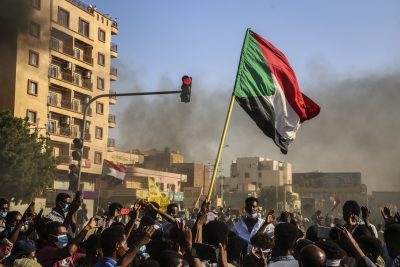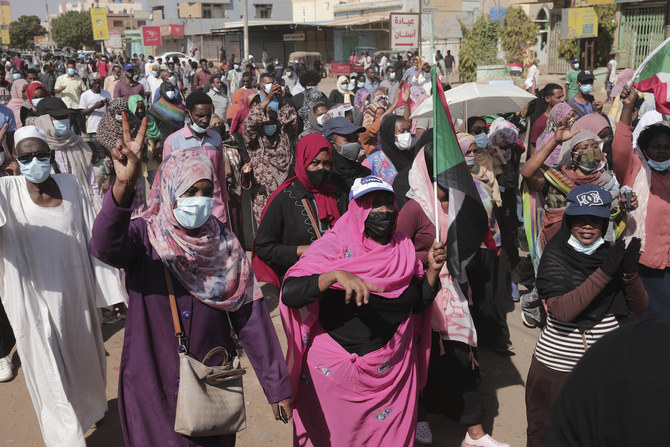Sudanese Mass Organizations Reject Overtures by Military Junta
Protestors remain in the streets in various states across the country

All Global Research articles can be read in 51 languages by activating the “Translate Website” drop down menu on the top banner of our home page (Desktop version).
To receive Global Research’s Daily Newsletter (selected articles), click here.
Visit and follow us on Instagram at @crg_globalresearch.
***
A new “Sovereign Council” has been inaugurated in the Republic of Sudan without the endorsement of the leading forces within the ousted administration.
On October 25 the military leadership of General Abdel Fattah al-Burhan and Commander of the Rapid Support Forces (RSF), General Mohamed Hamdan Dagalo (Hemetti), took complete control of the state and placed under house arrest interim Prime Minister Abdalla Hamdok.
These actions were in line with a reemerging phenomenon of military coups on the African continent which began during the 1960s. In many cases, the undemocratic usurpation of authority were guided and marionetted by the United States Central Intelligence Agency (CIA) and the State Department as was the case in the Democratic Republic of Congo (DRC) in 1960 and the Republic of Ghana in 1966.
Sudan has been an independent nation since 1956, one of the first national independence movements which succeeded against British imperialism. The following year, 1957, the former Gold Coast became Ghana under the leadership of the Convention People’s Party (CPP) headed then by Dr. Kwame Nkrumah.
The Sudanese Professional Association (SPA), a founding organization within the broader Forces for Freedom and Change (FFC), has rejected an offer by the Transitional Military Council (TMC) of al-Burhan and Hemetti to become a part of the revised “Sovereign Council”. Undoubtedly, the current regime will continue to be dominated by the military.
People opposed the coup and the appointment of another interim body dominated by the military immediately reacted to al-Burhan’s moves by blocking roads with burning tires. Thousands of images of the unrest were widely circulated over social media.
On November 13, hundreds of thousands took to the streets in various cities around Sudan including Khartoum, where the capital is located. Despite the arrest of many political leaders and other repressive measures enacted by the military, the turnout to the protests were enormous. Obviously much of the mobilization efforts were conducted clandestinely since the military coup makers control the armaments, broadcasting services, internet connectivity and other critical organs of the state.
Since the eruption of social unrest in December 2018, untold numbers of people have lost their lives in resistance activities. In the aftermath of four months of marches, rebellions and general strikes, in early April 2019 the military overthrew the administration of the-then President Omar Hassan al-Bashir. However, the people leading the opposition forces wanted a civilian government to determine the future of this centrally located and resource-rich African nation.
An article in the Sudan Tribune said of the manifestations on November 13:
“According to medical reports, five protesters were killed in Khartoum state, four with bullets, and the fifth after inhaling tear gas, and there are many wounded in the various cities of Khartoum State. Besides Khartoum state, reports from other states say that thousands protested in Dongola and Kareema, in Northern State, Atbara of the Nile River State and Madani of Algazira State. In the Darfur region, demonstrators came out in El Fasher and Nyala, where 64 demonstrators were arrested. The pro-democracy protests also took place in Port Sudan of the Red Sea State and Kosti of the While Nile. The 13 November protests were organized by the Sudanese Professionals Associations and the Resistance Committees in support of the civilian state in Sudan.”
Sudan mass demonstrations continue against the coup (Source: Abayomi Azikiwe)
Prime Minister Hamdok has dismissed any suggestion that he resume his duties as interim leader of the Sovereign Council and is demanding the reinstatement of the Constitutional Declaration which was negotiated with the involvement of the African Union (AU). Several other members of the cabinet which was removed in the October 25 putsch also continue to be detained.
Since the first recent military coup of April 2019, which effectively blocked any attempt at forming a national democratic government led by civilians from various political parties, trade unions, mass and professional groupings, the TMC has received support from the monarchies of Saudi Arabia and United Arab Emirates (UAE), Egypt and the State of Israel. In defiance of its own constitutional law established in 1958, the Sovereign Council agreed to “normalize relations” with Tel Aviv. Since this measure was adopted at the aegis of the former U.S. President Donald Trump, there appears to have no exchange of diplomatic missions.
Nonetheless, there are several reports claiming that the TMC has deployed a delegation to Tel Aviv for private discussions. Later there were articles saying the Israelis have sent a team to Khartoum for talks. Despite the role of Saudi Arabia, the UAE, Egypt and Israel, the social conditions are dire in Sudan. The political unrest is clearly fueled by the declining living conditions inside the country.
International Impact of the Coup
Of course, the State Department is shuttling back and forth from Washington to Khartoum in an effort to appear concerned about the situation in Sudan. The tactics of the Trump administration, and the essentially unchanged policies of the current President Joe Biden, have been a destabilizing factor in the country.
The initial Sovereign Council which was chaired as well by al-Burhan although Hamdok was the civilian head, agreed to a number of commitments which will further render Sudan into indebtedness to the world capitalist system. International finance capital has agreed to lend Khartoum money under certain conditionalities which will not enhance its ability to become a genuinely independent and self-sustaining state.
Hamdok and al-Burhan signed obligations to pay hundreds of millions in U.S. dollars to survivors of victims of terrorist attacks which occurred long before the removal of President al-Bashir. The Sovereign Council was coercively manipulated into signing such agreements in exchange for the removal of Sudan from the list of “state sponsors of terrorism.”
If anything can be learned from the previous six or more decades of independent African countries is the role of funding institutions such as the International Monetary Fund (IMF) and the World Bank in derailing the development strategies of post-colonial states. In light of the economic crisis largely precipitated by the COVID-19 pandemic, the potential for a renewed round of borrowing and refinancing of loans among AU member-states is highly likely.
Whither Sudan?
The debt incurred by the Sudanese people compounded by the political discontent caused by the acquiescence to the so-called “Abraham Accords”, designed to undermine solidarity with the Palestinian struggle against the Israeli regime, unless revoked, will only further hamper the capacity of Khartoum to unify under a civilian administration. Within a broader international context, Washington and Tel Aviv along with their allies among the Gulf monarchies, can only offer further indebtedness and war to the people of Sudan and Africa as a whole.
The AU in a statement from the Commission Chairperson Moussa Faki Mahamat notes:
“On the 6th of November, the African Union Peace and Security (PSC) Council suspended Sudan’s membership in the regional organization after the 25th October military coup in violation of the African Union brokered constitutional declaration of 17 August 2019 governing the transitional period. The PSC said that the suspension would continue until the reestablishment of a civilian-led authority. However, coup leaders continue to detain Prime Minister Abdallah Hamdok, his prominent advisers and cabinet members as well as political leaders.”
Nevertheless, until the resources allocated by imperialism and its allies internationally are halted, the continued subversion of the revolutionary democratic process by the TMC will further stall the total transformation of the country. The mass organizations are calling for additional marches and work stoppages. The fragility of the new “Sovereign Council” will be clearly illustrated since it cannot make any serious case for its existence beyond stifling a progressive path forward.
The new regime is composed of the military along with some leaders of the armed opposition groups which had negotiated a peace agreement in Juba, Republic of South Sudan. These maneuvers have been met with derision and civil disorder. At some point, sooner or later, the tenuous alliance engineered by al-Burhan and his international patrons will burst asunder due to the burgeoning domestic and global opposition to, yet another, neo-colonial construct manufactured in Washington, New York and Tel Aviv.
*
Note to readers: Please click the share buttons above or below. Follow us on Instagram, @crg_globalresearch. Forward this article to your email lists. Crosspost on your blog site, internet forums. etc.
Abayomi Azikiwe is the editor of Pan-African News Wire. He is a frequent contributor to Global Research.
Featured image: Sudan demonstrators raise flag during anti-coup protest, Nov. 13, 2021 (Source: Abayomi Azikiwe)


